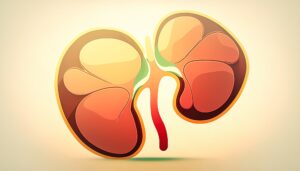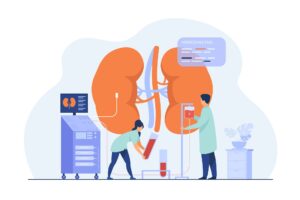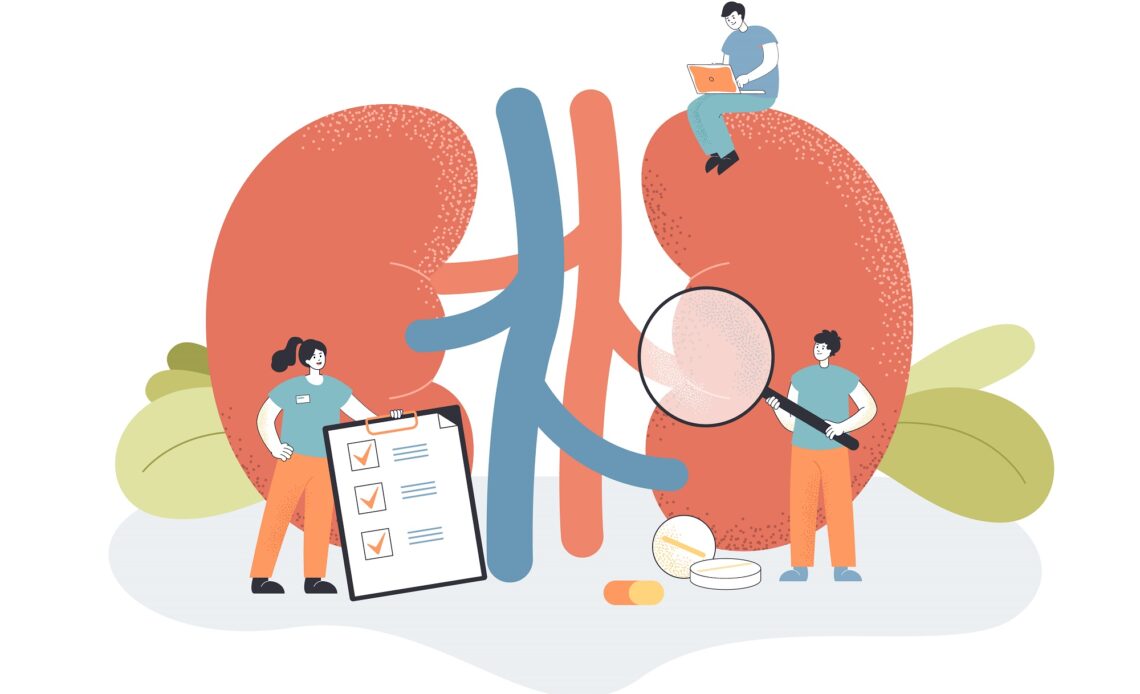Kidneys: The Unsung Heroes of Our Bodies
Our kidneys perform vital functions that keep us alive and healthy every single day. Yet most people hardly give them a second thought. That is, until something goes wrong. Kidney disease is surprisingly common, affecting around 15% of adults in the United States. It can lead to life-threatening complications if left untreated. Unfortunately, kidney problems often develop slowly and without symptoms at first. By the time they’re detected, the kidneys may already be significantly damaged.
That’s why it’s so important to understand the risks and get tested regularly if you have diabetes, high blood pressure, or a family history of kidney disease. With early detection and proper management, kidney damage can be slowed or prevented. Healthy kidneys filter wastes and excess fluid from the blood, regulate blood pressure, stimulate red blood cell production, and perform many other essential jobs. Let’s explore why our kidneys are not to be taken for granted.
Functions of the Kidneys

The kidneys serve several vital functions that help maintain overall health and homeostasis in the body. Here are some of the major roles that the kidneys play:
Filter Blood
One of the main jobs of the kidneys is to filter the blood and remove waste products. The kidneys act as a natural filtration system, clearing out toxins, excess fluids, and other impurities from the blood so they can be excreted from the body. This helps keep the blood clean and chemically balanced.
Regulate Fluid Levels
The kidneys regulate the body’s fluid levels by controlling how much water is excreted as urine versus retained in the body. When the body is dehydrated, the kidneys conserve water to boost fluid volume. When fluid levels are too high, the kidneys excrete more water through urine production. This fluid balance is important for blood pressure, electrolyte levels, and more.
Remove Waste
In addition to filtering blood, the kidneys remove waste products that are produced by normal metabolic activity. These waste products, such as urea and uric acid, are toxic if they build up in the body. The kidneys excrete these wastes through the urine so they can be eliminated from the body.
Control Blood Pressure
The kidneys help regulate blood pressure through a few mechanisms. They manage fluid volume and produce renin, a hormone that constricts blood vessels. The kidneys also balance electrolytes like sodium and potassium, which impact blood pressure.
Make Hormones
The kidneys produce several hormones, including calcitriol, renin, and erythropoietin. Calcitriol helps regulate calcium levels and bone health. Renin controls blood pressure. Erythropoietin stimulates red blood cell production in the bone marrow. These hormones circulate in the bloodstream and target different tissues.
Common Kidney Diseases
The kidneys can be affected by various conditions and diseases. Some of the most common kidney diseases include:

- Chronic kidney disease (CKD) – This is a gradual loss of kidney function over time. The most common causes are diabetes and high blood pressure, which damage the kidneys’ filtering units called nephrons. As CKD worsens, dangerous levels of fluids and waste can build up in the body.
- Kidney stones – Hard deposits of minerals and salts can form in the kidneys, causing extreme pain in the back or side. Small stones may pass naturally, but larger ones may need to be broken up with sound waves or removed surgically. Staying hydrated and avoiding excess salt, protein, and sugar can help prevent kidney stones.
- Urinary tract infections (UTIs) – Bacteria getting into the urinary tract can inflame the bladder and kidneys. UTIs cause pelvic pain and burning during urination. They are easily treated with antibiotics but can become serious if they spread to the kidneys. Good hygiene helps prevent UTIs.
- Polycystic kidney disease – Genetic disorder where cysts develop and enlarge the kidneys over time, reducing function. Eventually dialysis or a kidney transplant may be needed.
- Glomerulonephritis – Inflammation of the tiny filtering units called glomeruli damages the kidneys’ ability to filter waste. It can be caused by infections, autoimmune diseases, and conditions that affect blood vessels. Treatment depends on the underlying cause.
Risk Factors
There are several risk factors that can increase a person’s chances of developing kidney disease. The most common risk factors include:
- Diabetes – Diabetes is one of the leading causes of kidney disease. Over time, high blood sugar levels from uncontrolled diabetes can damage the delicate blood vessels in the kidneys. This impairs the kidneys’ ability to filter waste properly.
- High blood pressure – Uncontrolled high blood pressure puts extra strain on the blood vessels in the kidneys. This added pressure damages the vessels and causes the kidneys to lose their filtering abilities over time.
- Heart disease – Heart disease and kidney disease often go hand-in-hand. They are both causes and complications of each other. Damaged blood vessels from heart disease can impair the kidneys’ functions.
- Smoking – Smoking cigarettes negatively impacts kidney health in numerous ways. The chemicals in tobacco smoke cause inflammation and restrict blood flow to the kidneys. This accelerates kidney damage.
- Obesity – Carrying excess weight puts strain on many organs, including the kidneys. Obesity leads to increased inflammation and high blood pressure, both of which impair kidney function. Losing weight helps reduce the risk.
- Family history – Some kidney diseases and disorders can run in families. Having a close relative with kidney disease increases an individual’s likelihood of developing it themselves. Genetics play a role.
Symptoms
Kidney disease often develops slowly over many years and symptoms may be subtle at first. Some common symptoms include:
- Fatigue: As kidneys lose their ability to function properly, waste builds up in the bloodstream, leading to fatigue and overall weakness. Even mild kidney disease can make it hard to have the energy to get through daily activities.
- Swelling (edema): Excess fluid and waste in the bloodstream can lead to swelling in the legs, ankles, feet, face and hands. Swelling can range from mild to severe.
- Changes in urination: Kidney disease can lead to reduced urine output, abnormal color or cloudiness, a strong odor, pain or burning during urination, or a constant need to urinate. Urine may be foamy or bubbly, signs of protein in the urine.
- Shortness of breath: Anemia and fluid retention caused by kidney disease can make it harder to breathe and cause shortness of breath, especially when exercising or doing other physical activities.
- Nausea and vomiting: When kidneys aren’t filtering properly, toxins and waste build up and can cause nausea and vomiting. Loss of appetite is also common.
- Itching: Phosphorus and calcium imbalance caused by kidney disease leads to itchy skin. Some people experience a persistent feeling of pins and needles.
Tracking any symptoms is important, as early detection and treatment of kidney disease offers the best outcomes. If you notice any of these symptoms, see your doctor and request testing. Kidney disease is serious, but manageable when caught early.
Diagnosis
Diagnosing kidney disease involves a combination of blood tests, urine tests, imaging scans, and sometimes a biopsy.
Blood tests
Blood tests measure levels of waste products like creatinine to estimate the glomerular filtration rate (GFR), which indicates how well the kidneys are filtering blood. Higher than normal levels may indicate kidney disease. Blood tests can also check for levels of electrolytes, and measure kidney function over time.
Urine tests
A complete urinalysis looks at physical characteristics of the urine as well as its chemical makeup, and can detect protein, blood, bacteria, and other signs of kidney dysfunction. Other urine tests can estimate GFR and check for specific proteins associated with certain kidney diseases.
Imaging tests
Imaging tests like ultrasound, CT scans, and MRIs allow doctors to visualize the kidneys and urinary tract to check for structural abnormalities, kidney stones, tumors, and other problems. These scans show detailed internal views of the kidneys and surrounding areas.
Biopsy
A biopsy involves removing a small piece of kidney tissue to examine under a microscope. This helps definitively diagnose some kidney diseases and determine treatment. Biopsies are only done when non-invasive tests are insufficient to determine the cause and extent of kidney dysfunction.
Treatment
There are several treatment options for kidney disease depending on the cause and severity.
Medication
Medications can help treat the underlying cause of kidney disease and manage symptoms. Common medications include:
- ACE inhibitors and ARBs to lower blood pressure and prevent further kidney damage.
- Diuretics to reduce fluid buildup.
- Erythropoietin to stimulate red blood cell production if anemia is present.
- Vitamin D supplements if levels are low.
- Pain relievers.
- Medications to treat high cholesterol.
Dialysis

If the kidneys are no longer functioning adequately, dialysis is needed to filter waste and excess fluid from the blood. The two types of dialysis are hemodialysis and peritoneal dialysis. Hemodialysis uses a machine to filter blood, while peritoneal dialysis uses the lining of the abdomen to filter blood inside the body.
Surgery
Surgery may be done to treat specific causes of kidney disease, such as removing kidney stones or cysts. A kidney transplant may also be an option for some patients with end stage renal disease.
Lifestyle Changes
Making healthy lifestyle changes can help slow the progression of kidney disease. Recommendations include:
- Following a kidney-friendly diet lower in sodium, phosphorus and potassium.
- Controlling blood sugar levels if diabetic.
- Losing weight if overweight.
- Exercising regularly.
- Quitting smoking.
- Limiting alcohol intake.
- Drinking plenty of fluids.
Following the treatment plan closely under the care of a nephrologist is important for preserving remaining kidney function as long as possible.
Prevention
The best way to preserve kidney health is through preventive measures. There are several ways to reduce your risk of developing kidney disease:
- Control blood pressure – High blood pressure is one of the leading causes of kidney disease. Work with your doctor to keep your blood pressure at or below 140/90 mmHg. This may involve medications, diet changes, exercise, and other lifestyle adjustments.
- Manage diabetes – Diabetes is another major risk factor for kidney disease. If you have diabetes, diligently manage your blood sugar levels through medication, diet, exercise and testing. Work to keep your HbA1c level (average blood sugar over 2-3 months) under 7%.
- Stay active – Regular physical activity strengthens the heart and blood vessels, lowers blood pressure, manages weight, and prevents diabetes. Aim for at least 30 minutes per day of moderate activity, like brisk walking.
- Maintain healthy weight – Carrying excess weight puts strain on the kidneys and other organs. Work towards reaching or maintaining a healthy BMI through diet and exercise.
- Avoid smoking – Smoking constricts blood vessels, impairing kidney function. Quitting smoking, along with other lifestyle improvements, can dramatically reduce your risk.
Outlook
The prognosis for kidney disease depends on the underlying cause and how early it is detected and treated. In many cases, early detection and treatment can slow or stop the progression of kidney disease and prevent kidney failure.
For chronic kidney disease, there are 5 stages based on the glomerular filtration rate (GFR), which measures kidney function. Stage 1 CKD has minimal kidney damage with normal or high GFR above 90 mL/min. At this stage, kidney disease often goes undetected with no symptoms. Stage 2 (GFR 60-89 mL/min) and Stage 3 (GFR 30-59 mL/min) show mild to moderate loss of kidney function, but are still considered early stages. Lifestyle changes and medication may stop or slow further progression at these stages.
Stage 4 CKD (GFR 15-29 mL/min) indicates severe loss of kidney function. Quality of life is impacted as the kidneys lose their ability to filter wastes. Dietary restrictions, dialysis, or a kidney transplant may be needed. Finally, Stage 5 CKD (GFR below 15 mL/min) is kidney failure or end-stage renal disease requiring dialysis or transplant for survival. Without treatment, Stage 5 CKD has a high mortality rate. With dialysis or transplant, the 5-year survival rate is around 50%, but this varies based on age and other health factors. Successful transplantation can restore close to full kidney function and enables many to live active lives with near normal life expectancy. Quality of life is often improved compared to dialysis treatment. However, transplant patients require lifelong immunosuppressive medications with side effects.
Takeaway
The kidneys play a vital role in the body, filtering waste and excess fluid from the blood to maintain homeostasis. When the kidneys are damaged, waste can build up in the blood, leading to life-threatening complications. That’s why it’s so important not to take your kidneys for granted.
There are several ways you can help keep your kidneys healthy and reduce your risk of kidney disease:
- Stay hydrated by drinking plenty of water. Dehydration strains the kidneys.
- Eat a balanced, low-sodium diet. Limit processed foods high in sodium, which can raise blood pressure and contribute to kidney disease.
- Manage conditions like diabetes and high blood pressure, which are leading causes of kidney disease when left uncontrolled. Work with your doctor to keep these under control.
- Maintain a healthy weight. Obesity puts stress on the kidneys and is a risk factor for disease.
- Avoid overuse of OTC pain relievers like ibuprofen, which can damage kidney function when taken regularly in high doses.
- Don’t smoke. Smoking constricts blood vessels in the kidneys and can worsen kidney disease.
- Get your kidneys checked if you have any risk factors or notice symptoms like changes in urination, swelling, or fatigue. Catching and treating kidney disease early is important.
Your kidneys work hard every day to filter your blood and keep you healthy. Do your part to take care of them by making lifestyle changes and getting screened if at risk. Healthy kidneys will repay you by filtering waste from your body for many years to come.


